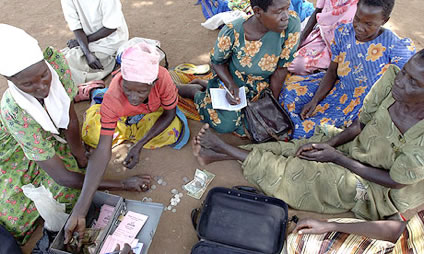
Madeleine Bunting
Women's rights are in danger of becoming a wordfest
(guardian.co.uk, 27 january 2011).
 |
| Katine VSLAs group Women attending a meeting of their village savings and loans association in Katine, north-east Uganda, which has given some women some power over their finances. Photograph: Martin Godwin |
Now here is a wheeze that seems like a good idea - become a godmother of the new UN agency for women. UN Women is an organisation that could easily sink into obscurity, and one rather suspects that that is precisely the future which is being planned for it by some. What UN Women needs is a public closely watching to see what happens, hence this rather nifty idea from VSO to sign up to become "a godmother" so that you get updates on what's happening at the agency. Remember the crucial element in UN politics is publicity, and VSO is trying to harness that.
The urgent problem is that UN Women doesn't have a fraction of the resources it needs to have an impact. Earlier this week, the new executive director, Michele Bachelet, made a characteristically robust speech pleading for resources to get UN Women working. Its official launch is next month.
Original estimates of the kind of budget it would need were put at US$100bn. The World Bank has estimated it would cost $83bn to achieve millennium development goal three (promote gender equality and empower women). But very quickly the start up budget was set at around $500m, and now Bachelet is struggling with pledged resources of considerably less than that amount. The agency is struggling to plan its work without knowing what kind of funding it can count on. It has a tiny staff inherited from its predecessor, Unifem, and few regional offices.
There have been plenty of concerns about how effective this new UN body would be. The executive board includes countries such as Saudi Arabia, which could act as a serious brake on tackling some issues. But the appointment of Bachelet has given it real credibility; an immensely effective and much admired politician, she has given up her own domestic political ambitions to take on the job. In her speech this week she identified five key areas that need to be addressed, first of which is increasing the participation, voice and leadership of women in all areas of society – one thing is for certain, Bachelet is not dodging difficult issues. But she needs money to do it.
Two of the countries that were crucial to the creation of UN Women – the US and the UK - are yet to announce what contribution they will make to the new body. Both have made much play in recent years of their commitment to the cause of women – it's part of how Hillary Clinton has attempted to reshape US foreign policy, which I wrote about recently.
VSO's head of external relations, Kathy Peach, is urging the UK to set the precedent by announcing its commitment and calls for a contribution of about £20m annually, which would put it on a par with its funding of another UN agency, Unicef, which is dedicated to children's welfare. The UK government is currently reviewing all its funding to multilateral organisations such as the UN and is not expected to announce its decision until next month. Campaigners are pressing Andrew Mitchell, the UK international development secretary to live up to his rhetoric on the importance of women.
William Hague, the UK foreign secretary, has also expressed his commitment to women's rights.
In a speech given at an event organised by the No Women No Peace campaign, Hague said: ".... Internationally, we cannot hope to find just and equitable solutions to global problems unless women are involved at every stage. We will not redress this balance until all women have access to the education and opportunity, which is their birthright, and surmount the barriers erected by prejudice, political oppression, intolerance, or hatred."
Campaigners argue that the UN has historically marginalised women with less than 1% of its funding directly addressing gender inequality. So the issue is long overdue for redress.
It's odd. There is now a powerful consensus about the central role of women in development. They are the key agents of change given their impact on the health and education of the next generation. Everyone is agreed that women's empowerment is vital, and it crops up in countless speeches by politicians all over the world. And yet change is achingly slow – embarrassingly so. Look at the World Economic Forum at Davos this week, where organisers have had to set quotas for women, given the appalling gender imbalance of the crucial networking event. Women's rights are in danger of becoming a wordfest.
This disparity between the aspirations and the effective action to achieve change is going to be starkly apparent in the next couple of months. In March, it's the 100th anniversary of International Women's Day. The Guardian is compiling its own list of the 100 most inspiring women and other campaigners, such as Women Deliver, are doing likewise. In the run up to 8 March, expect a lot more speeches on women's empowerment, but the real thing to look out for – and insist on – is that the best way to mark the milestone is signing up to properly fund UN Women.
• This article was amended on 27 January 2011. The original stated that the start up budget for UN Women was half the estimated amount needed. This has been corrected.